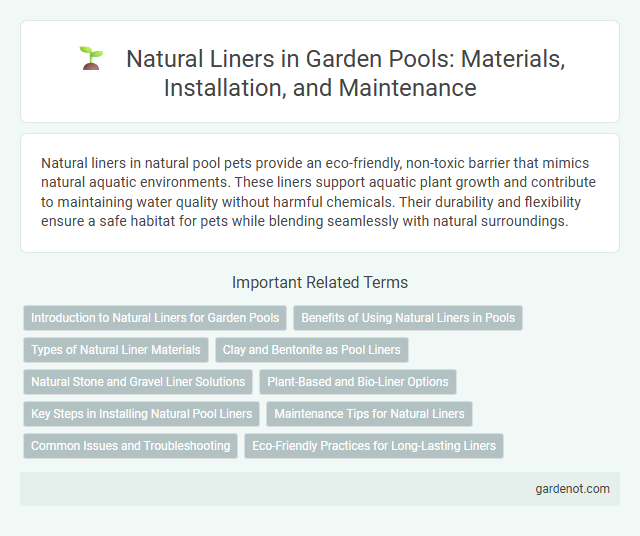Natural liners in natural pool pets provide an eco-friendly, non-toxic barrier that mimics natural aquatic environments. These liners support aquatic plant growth and contribute to maintaining water quality without harmful chemicals. Their durability and flexibility ensure a safe habitat for pets while blending seamlessly with natural surroundings.
Introduction to Natural Liners for Garden Pools
Natural liners for garden pools are crafted from eco-friendly materials such as clay, bentonite, or natural rubber, providing a sustainable and non-toxic waterproof barrier. These liners blend seamlessly with the surrounding landscape, promoting a harmonious and organic aesthetic while maintaining durability against water loss and soil erosion. Incorporating natural liners supports biodiversity by minimizing chemical leaching and fostering a healthier aquatic environment within garden pools.
Benefits of Using Natural Liners in Pools
Natural liners in pools provide eco-friendly, non-toxic waterproofing that enhances water quality by minimizing chemical use. They offer durability and flexibility, adapting to pool shapes while reducing maintenance costs and preventing leaks. The use of natural materials supports sustainable construction practices, promoting environmental harmony and long-term pool health.
Types of Natural Liner Materials
Natural liner materials for pools include clay, bentonite, and natural rubber, each offering unique benefits for creating eco-friendly, watertight barriers. Clay provides excellent impermeability by swelling when wet, making it ideal for traditional pond liners. Bentonite, a type of absorbent clay, expands significantly upon hydration, sealing cracks and preventing water seepage, while natural rubber offers durability and flexibility suitable for custom-shaped natural pools.
Clay and Bentonite as Pool Liners
Clay and bentonite are highly effective natural liners for pools due to their exceptional impermeability and eco-friendly properties. Bentonite, a type of absorbent clay, swells upon contact with water, creating a dense, watertight seal ideal for sustainable pool construction. These natural liners provide a chemical-free solution that maintains water purity while blending seamlessly with the surrounding environment.
Natural Stone and Gravel Liner Solutions
Natural stone and gravel liner solutions provide an eco-friendly and durable base for natural pools, ensuring water remains clean while promoting natural filtration. These liners offer excellent permeability, allowing beneficial microorganisms to thrive and maintain balanced water chemistry without harmful chemicals. Their aesthetic appeal blends seamlessly with natural surroundings, enhancing the pool's organic design while supporting sustainable water management.
Plant-Based and Bio-Liner Options
Plant-based and bio-liner options for natural pools offer eco-friendly alternatives to traditional synthetic liners, enhancing water quality and promoting a balanced aquatic ecosystem. These liners are made from renewable, biodegradable materials that support natural filtration processes by encouraging beneficial microbial activity. Using plant-based or bio-liners reduces chemical usage and improves the sustainability of natural swimming environments.
Key Steps in Installing Natural Pool Liners
Installing natural pool liners involves meticulous site preparation to ensure a smooth, debris-free surface, preventing punctures and leaks. Selecting high-quality, environmentally safe liner materials such as EPDM rubber or bentonite clay enhances durability and natural filtration. Proper overlapping and sealing of liner edges, followed by gradual water filling and careful vegetation integration, maintain structural integrity and promote ecological balance.
Maintenance Tips for Natural Liners
Natural liners in pools require regular cleaning using gentle, non-abrasive brushes to prevent algae buildup and maintain their natural appearance. It is essential to monitor pH levels between 7.2 and 7.6 to protect the liner material from chemical damage and prolong its lifespan. Periodic inspection for tears or punctures ensures early repair, preserving water quality and preventing costly replacements.
Common Issues and Troubleshooting
Natural pool liners often face issues such as punctures, algae growth, and improper sealing. Regular inspection can help identify tears or holes, which can be repaired with specialized patch kits designed for natural materials. Ensuring correct installation and using UV-resistant liners minimizes algae buildup and extends the liner's lifespan.
Eco-Friendly Practices for Long-Lasting Liners
Natural liners for pools use sustainable materials such as recycled rubber and biodegradable composites that minimize environmental impact. These eco-friendly liners resist UV exposure, algae growth, and chemical degradation, ensuring durability and reducing the need for frequent replacements. Implementing natural liner solutions supports water conservation and promotes a healthier ecosystem by avoiding toxic leachates associated with synthetic alternatives.
Natural liner Infographic

 gardenot.com
gardenot.com